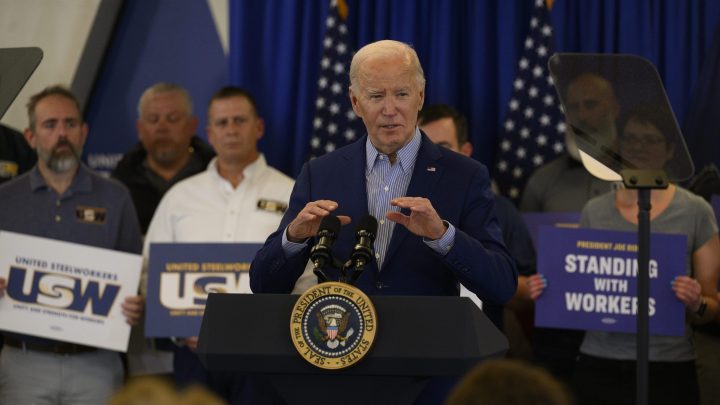
Once again: Who pays for tariffs on Chinese steel?

Back in 2018, tariffs were all over the headlines. Then-President Donald Trump imposed a number of different duties on goods the U.S. imports, including some on aluminum and steel made in China. And when President Joe Biden came into office, a lot of those tariffs didn’t go away.
Those tariffs were back in the news on Wednesday, because Biden is calling on the U.S. trade representative to triple certain tariffs on Chinese steel and aluminum.
When Trump was in office, he used to say China would pay all the new tariffs on its exports to the U.S. That’s not really what happened.
“In fact, it was U.S. consumers and industries here that ended up paying the tariffs,” said Inu Manak, a fellow for trade policy at the Council on Foreign Relations. “At the end of the day, what the administration had hoped to achieve certainly did not come to fruition.”
What did come to fruition was an increase in steel prices. And that definitely had an effect on American companies that use steel to make other stuff, said Katheryn Russ, an economics professor at the University of California, Davis.
“These increases in steel prices for domestic manufacturers end up making it harder when our steel-using manufacturers export abroad,” Russ said.
All right, but the whole point of the tariffs was to boost domestic manufacturing and the domestic steelmaking industry. So, did they get more people working in the steel sector?
“If you really squint, you might see a thousand extra jobs in that sector,” Russ said.
What has happened is direct Chinese steel exports to the U.S. have declined, but they were never very big to begin with.
Meanwhile, since China’s construction sector has struggled recently, it has more steel than it needs, said Gordon Johnson, whose firm, GLJ Research, analyzes the industry.
“They’ve had to find other places to put their steel. So they’re exporting that steel to the rest of the world,” he said.
But, Johnson said, since steel prices are higher in the U.S., a lot of that cheaper Chinese steel still makes its way here by way of other countries.
“So China can shoot their steel into Poland, thus negatively affecting Polish steelmakers. And then Polish steelmakers, therefore, will shoot their steel into the U.S.,” he said.
So ultimately, raising tariffs even further on Chinese steel might not do much, Johnson said, but, “both Biden and Trump are going to use the steel industry as a political football to show that they’re tough on China.”
Which is why he thinks the stock value of some steel companies will rise in the months ahead.
There’s a lot happening in the world. Through it all, Marketplace is here for you.
You rely on Marketplace to break down the world’s events and tell you how it affects you in a fact-based, approachable way. We rely on your financial support to keep making that possible.
Your donation today powers the independent journalism that you rely on. For just $5/month, you can help sustain Marketplace so we can keep reporting on the things that matter to you.
















